

| By bus, train and boat to Baku | |
Turkestan (Kazakhstan) to Baku (Azerbaijan), September 2015
|
|
|
|
|
The western part of Kazakhstan is visited by relatively few travellers. Turkistan, a town with a famous mausoleum, is visited by a few, but that’s the westernmost point that many reach. The reason is understandable: vast traveling distances and little appealing sights. We nevertheless decided to move step by step through this vast country. As usual, we try to cover the distances during daylight hours, so we can see the changes in the landscape. The latter doesn’t seem necessary in Kazakhstan, since there seems to come no end to the immense steppe. Our first stop after Turkistan is Kyzylorda; for a short while this was the capital of the Soviet republic of Kazakhstan. It is a hot, dusty town with friendly people who giggle nervously when we speak to them in English. Remarkably few Kazakhs speak English outside Almaty, Astana and Aktau. People are very helpful, although it seems they really do not understand that we do cannot understand their language. On the train from Kyzylorda to Aralsk we are getting hot water at the samovar when the wagon manager asks us in Russian whether we speak Russian. We recognize this common question, so we can answer it we with a resounding "no". "Then you must speak Kazakh" she asks hopefully. If we deny it, she walks away while shaking her head. You can see her thinking: "strange foreigners". |
|
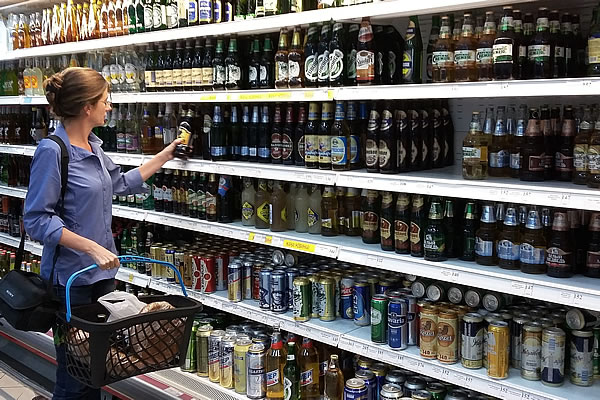 |
|
Time for a beer ... there is enough choice |
|
Aralsk is in our opinion well worth a short stop. Aralsk was once a thriving port town on the Aral Sea. Large-scale irrigation projects have led the lake almost to dry up. With a harbour without water, complete with cranes that previously hauled the cargo from the ships, the city is illustrative of the destructive consequences that human activities can have on nature (see also the article on Aralsk). A twelve-hour train ride separates us from the city of Aktobe. Again we travel during the day and we are using in the third class. Dutch former Soviet Union expert Jelle Brands Cortius describes the third class as a sort of refugee camps on wheels, but luckily it is not that bad. (see also the article about train travel in Kazakhstan) Travelling by train is a fun way to get in touch with the Kazakhs, although misunderstandings are difficult to prevent because of the language. Even sign language appears doesn’t seem universal. We are sitting near the toilets, close to the place where men can light a cigarette once in a while. While we drink coffee, a man comes to us and makes the gesture that, in our opinion, looks like lighting a match. Since we are close to the smoking area this seems logical, so we answer that we don’t have any fire. Hours later we are waiting in the aisle to disembark the train. The same man squeezes through the other waiting passengers and makes the match gesture again. "Does he want to light the train on fire?" is our first thought. Now, however, there is someone around who can translate. This good man isn’t a pyromaniac, but he wants to buy our coffee. A few hours ago we would have gladly offered him a cup of coffee, but our Nescafe is finished now, so this isn’t an option now. We find this regrettable, as we are regularly offered foods and sweets by local fellow travellers and this could have been a nice way to give something back. Aktobe is a city that transforms quickly because of the huge gas revenues that pour into the region. There is a clearly visible contrast between the drab Soviet flats and beautiful parks with shining marble monuments, which are put here to show off the newly acquired wealth. Typical relics of the Soviet era remain. The huge, overhead pipe lines crisscrossing the city to supply city heating always catch our eye. |
|
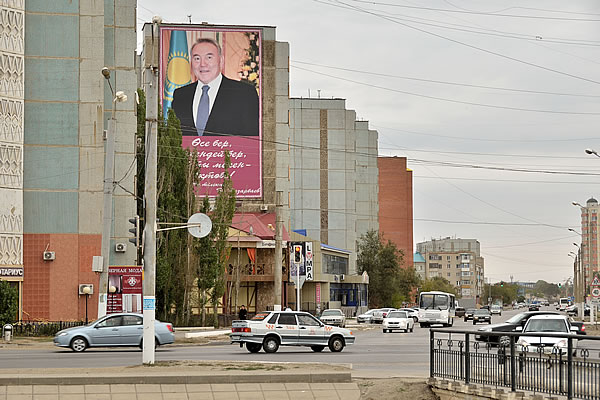 |
|
The portrait of president Nazarbajev is everywhere in Kazakhstan |
|
|
By bus we move to Uralsk; one of the more beautiful cities of West Kazakhstan. It has an attractive central area with traditional Russian homes. Atyrau, our next destination, is just like Aktobe city partly transformed by the abundant oil money. All the money seems to be spent in one single street, where the upper class entertain themselves in malls and fancy restaurants. Other parts of the city still look like the pre-oil Kazakhstan. With a 21-hour train ride we move to Aktau, to catch the ferry that brings us across the Caspian Sea (see the article and the pictures on the crossing). During the 59 hours that it takes, we have plenty of time to look back on our time in Kazakhstan. We have had a very good time, but we can imagine that this isn’t the most popular holiday destination on earth. Few people will want to spend their annual three-week holiday crossing Kazakhstan from East to West. But if you have more time, however, it is worth the effort. After crossing the Caspian Sea, we arrive in Baku, the capital of Azerbaijan. What a city! Azeri petrodollars are clearly used to giving the city a facelift. According to our hotel owner, Baku is engaged in a kind of competition with Dubai. The resemblance with Dubai isn’t that clear to us; of course you see some ultramodern buildings, but what strikes us more are the many outdoor cafes, luxurious parks and the atmospheric streets filled with people. This city is alive! If we had to describe it in one sentence: "a kind of small, young version of Paris". For ex-Soviet enthusiasts and fans of unusual sights, the area surrounding Baku also has plenty to offer. Our days are easily filled by photographing mud volcanoes, fire-mountains and plains filled with nodding donkeys (see also the photo impression of Baku). Baku is a city we didn’t have high expectations of on forehand, but so far we like it very much. |
|
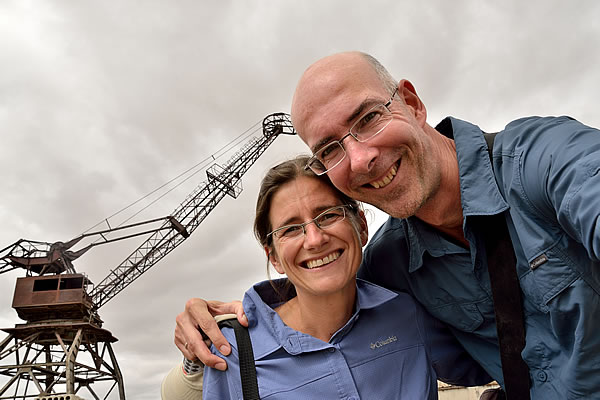 |
|
Selfi in front of a harbour crane in Aralsk |
|
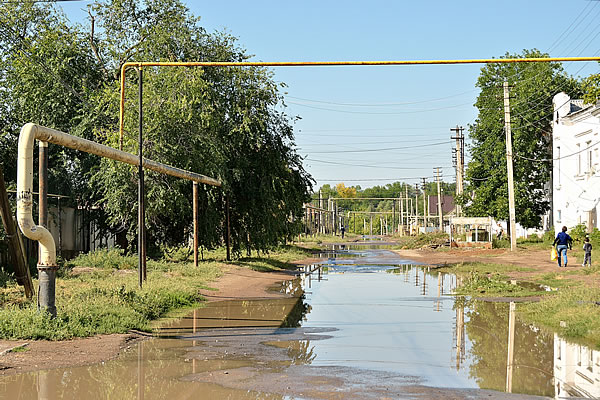 |
|
Pipes above the ground are still very common in Central Asia |
|
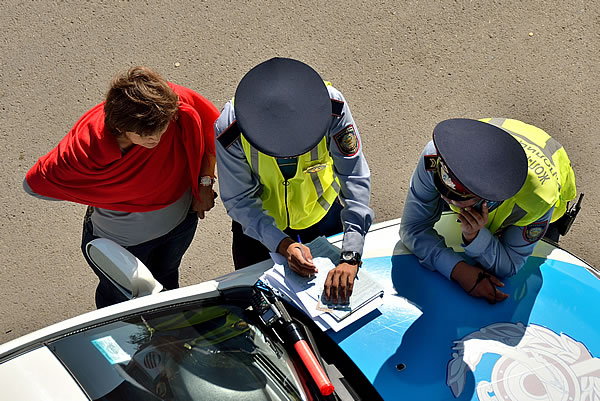 |
|
The traffic police is still a 'pain in the ass' |
|
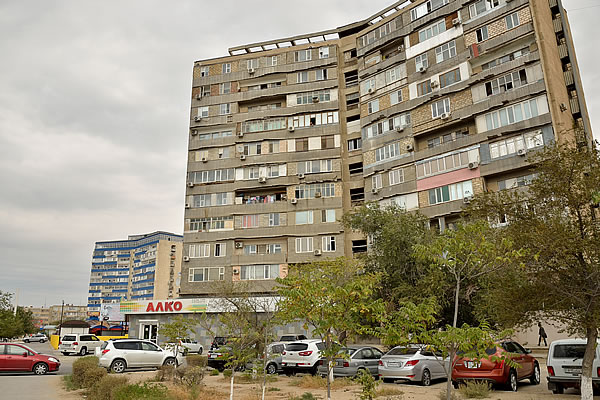 |
|
An old Soviet era appartment building in Aktau |
|
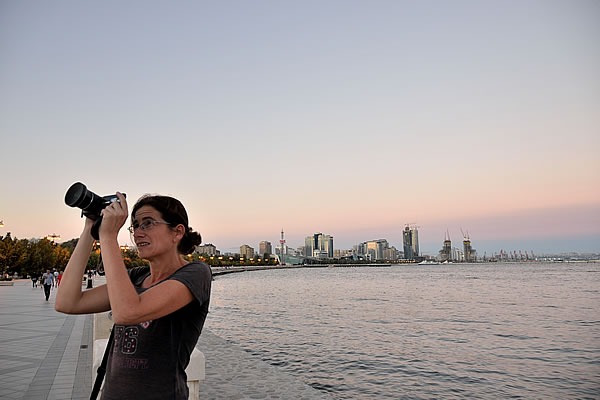 |
|
Finally in Baku © copyright - Babakoto.eu / 2015 |
|